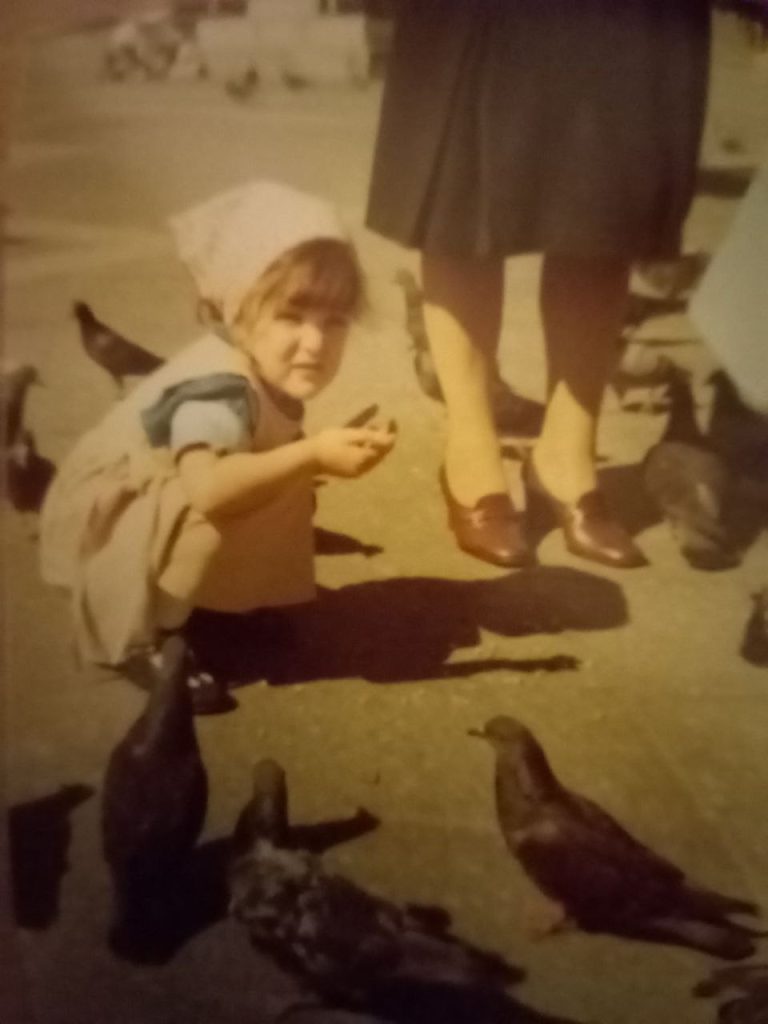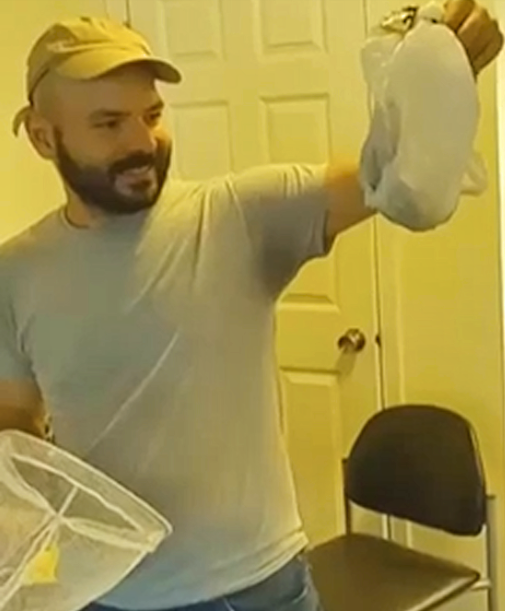Content note (click for details)
Death, grieving, medical abuseedited by Ziv Wities
When Estelle Irby died (at the young age of 43), her Skin did not. When the last bit of breath left the lungs, when the heart and brain had gone quiet and the limbs still and stiff, a shudder went down the length of the body that was once Estelle Irby (though, according to her hospice doctor Carter Rannow, the shudder was a normal thing, not an indication of any imminent abnormality or strange occurrence, such as the Skin leaving the body, which it did within moments of the aforementioned shudder).
And so, in those quiet seconds after her death, Estelle Irby’s wife August and their teenage daughter Yumi and Dr. Rannow watched as a piece of Estelle Irby removed itself from the body, like an out-of-body experience might be demonstrated in a film (you know, the soul lifting up and out, toward the ceiling, toward the heavens, as it were), only this was a kind of body-out-of-body situation. They watched as Estelle Irby’s Skin lifted itself up and off what had been Estelle’s internal hidden bits and pieces, and detached its hypodermis from the muscle and bone beneath, leaving behind a few stray hair follicles, sweat glands, fat layers, and nerve endings (because we all lose a bit of ourselves in this kind of process, one supposes).
The Skin was gentle with the (dead) body, pulling each living cell slowly away from its (dead) counterparts, and the sound was like a billion tiny kisses. This sound distracted August enough that what she might have found a horrific spectacle became instead a tearful remembering (in grief, yes, even in the earliest moments of grief, the smallest things may trigger an onslaught of emotions, and so it was with August). The sounds peeled through layers of memories of August and Estelle lying in bed at the end of a long day, Estelle kissing August in all manner of silly places, sending August into tired giggles, Estelle smacking August’s stomach with her lips (each new move goofier than the next), both of them collapsing into exhausted laughter.
For their daughter Yumi, the sound of the Skin extracting itself from her (dead, from now on) mother’s body kindled memories of Estelle Irby’s (once alive) lips as she tried to open particularly stubborn jar lids. Or when she contemplated a project problem in her woodworking shop, sucking and biting at the insides of her cheeks until they were raw and her mouth was coated lightly with blood (a habit she had had since she was five years old, the cheek walls never quite healing in her lifetime). But mostly, the sound of the Skin reminded Yumi of how Estelle clicked her tongue whenever Yumi presented her latest painting, almost always a dramatic affair (if sparsely catered with last night’s leftovers) in the family living room. August would applaud and praise, but Estelle would put on a show of being The Critic, clicking and puckering her mouth in all sorts of strange sounds meant to withhold Estelle’s true (always proud, always warm) feelings for as long as she was able, which kept Yumi on edge (and was all in good fun, but Yumi still, always, worried that that next painting would be a true disappointment, and Estelle, in that moment, may not be able to mask such a thing).
The Skin removing itself was a long process, but a necessary one (so it seems) to keep the Skin intact, so that it could step away from the body as one full human-shaped skin suit, the hair that was once Estelle Irby’s salt-and-pepper mane (she had started going gray early, in her 20s) flowing down to the top of what was once the skin of her lowermost back. And while August and Yumi were lost in their memories, Dr. Rannow watched the process closely, and sent a quick text to his nurse, who was downstairs, to ready a sedative and a large roll of plastic wrap (the nurse’s name was Carol, but he never remembered this, always called her Kristy with a K or some such thing, and she’d stopped correcting him).
The nurse, oblivious to what was happening with the Skin (though knowing Estelle Irby was bound to expire any minute, and hoping it would be soon, as she had a pre-paid Zumba class to go to that evening and did not want to lose that $30), was a bit confused at Dr. Rannow’s text, but supposed that August would need something to calm her, and perhaps there was more cleanup than expected.
Once fully removed, the Skin turned its face to the body and considered the exposed muscle and bone, not with human eyes but with each cell in itself (they somehow knew this, this way of looking, all who were in the room), and sweat began to prick ever so slowly from the Skin’s pores. Yumi would later suggest that this dribbling made the Skin look like it was crying, though August would only half-heartedly agree with this sentiment, as the smell of Estelle’s sweat did not make her think of tears but of something else more intimate, a mix of sex and days on the beach, and the extraordinary work of dying (no one talks about the sheer muscle it takes, death), of carrying Estelle up the stairs, of hot flashes in the middle of the night, sheets soaked.
After many minutes of (damp but silent) grieving, the Skin turned to leave. August and Yumi didn’t move to stop it, too overcome with the shock of Estelle Irby really being gone, her exposed insides lying quietly on the hospice-provided bed (like the quiet aside within a parenthesis left suddenly bare and exposed, Yumi would later suggest, and indeed, several of her paintings would play with such a textual theme). August quietly felt grateful that the bed would be taken away, that they had not allowed Estelle Irby to die in their shared bed (especially now) when she would, she was sure, turn over in her sleep toward Estelle’s side of the bed and see a skinned version of her wife rather than the whole person she wanted to remember.
During all this, Dr. Rannow made a list of the many ways he could retire on this discovery (the whole business of dying was tedious, boring, and certainly he couldn’t spend another thirty years doing this). What would the Skin reveal about humanity, about health, about what comes after (good or bad)? And how much would people pay for such a thing (has to be a lot, right)? The quickest way (he finally concluded) was to just sell off the ingredient itself (i.e. the Skin) and let other people figure it out. He realized (and this was indeed an epiphany of self, in this moment) that he didn’t much care what people did or discovered with it (a potion for long-life or immortality, real proof of a heaven or hell, a special spice for a barbecue, whatever, it was no skin off his nose, hahaha) as long as he got paid.
The good doctor was doing math in his head as the Skin grieved and Estelle Irby’s wife remembered their giggling late-night kisses, and Estelle Irby’s daughter thought about how she wouldn’t be able to show her next painting to her dead mother and she didn’t know what that would feel like (and she didn’t want to know, in fact she was thinking maybe she’d never paint again).
Estelle Irby was worth more dead than alive, Dr. Rannow thought as the Skin turned and headed down the stairs (how it could see those stairs was not something that those in the room considered, but you cannot discount muscle memory, and there were a few slices of muscle clinging to the Skin’s underside that could very well be part of its navigation).
As the Skin landed at the bottom of the stairs and headed for the front door, glancing only momentarily toward the living room, the nurse (with the plastic and the sedative ready in a syringe) was struck cold for a moment (perhaps the only one who had such a reaction, or whose mind was blank enough to truly receive the shock of a walking human skin suit). The nurse looked instinctively into the Skin’s eyes (oh boy, it did not have eyes) and, finding only darkness, immediately thought of her husband, whose dark nature had only become obvious to her in the last few years, now that she was too old (she thought) to leave, especially when she was the breadwinner, when he would most assuredly get half of what she owned in a divorce and would give her no peace, anyway.
And so, rather than thoughts of awe or money or sweet memories, the nurse focused on the present moment and how the Skin was smooth (Estelle Irby was young but still—she had great skin care too! wow!) and the head and eyes so hollow and the heart most obviously gone, left upstairs to rot, and she felt an anger she didn’t know she could feel. And so when the Skin reached the front door, the nurse was already behind it, poking it in the neck with the needle, careful not to go as far as she would when muscle lived under the skin (and bone and organs and so on), knowing she would have to strike where she thought major veins might still exist in some way. The Skin did not react, did not stop, in fact, but kept on, leaving (lightly) bloody footprints (because the extraction had been as gentle as described) in its wake. The nurse followed close behind with the plastic (counting down the six to eight seconds she expected it would take the sedative to kick in) until the Skin stopped and lost its balance, falling still and sleepy just as it was taking its first steps down the driveway. The nurse wrapped the Skin in the plastic (it was relatively light though heavier than you might expect, and easy to fold) and shoved it into the back of Dr. Rannow’s car long before August or Yumi or Dr. Rannow came downstairs. And by the look of the footprints, they figured the Skin had kept going (the lightly-bloody footprints having dried and disappeared into the oil-stained cement of the driveway), and wandered off to hide, like a dog who knows its time is near.
Once Estelle Irby’s leftover body had been taken away by the funeral home, and the hospice materials cleaned from the house, the good (ha) doctor and the nurse brought the Skin back to the office. The nurse had forgotten all about her Zumba class that evening (she would eat that $30 if it meant getting to cut into the Skin), and the good doctor was eager to get the Skin doled out in pieces to the highest bidders (a full-size skin suit would certainly draw attention). In the hours between the shuddering and the arriving at the office, the good doctor had settled into this new understanding of himself, realizing that most all of his scientific curiosity had drained out of him after his fourth year of med school and he was convinced that there was no improving this world (no matter what the Skin decided to reveal about the universe, or what products it led to), and he was eager, desperately so, for comfortable retirement.
And so Dr. Rannow called his colleagues and the businessmen he knew, and the businessmen his colleagues knew, as the nurse tied the Skin to an exam table (she delighted in the way the Skin struggled but had no strength to push her away). The nurse had to flatten the wrists entirely to strap the arms securely, and even when the Skin tried to bunch itself up (like the dead skin of a snake, perhaps, or a slinky) it was not thin enough to wriggle away. As the nurse waited for the good doctor to finish his phone calls, she watched that contraction (the wriggling) and imagined the Skin screaming (in truth it made no sound except for that soft scraping that your hands might make when you rub them together to warm up). She imagined the screaming of a bearded male voice (even though she knew very well the Skin was from Estelle Irby, whose voice was not gruff and who had no beard) and let that imagined scream wash over her as the Skin twitched and jerked and she collected the sharpest instruments in the office, the ones that could cut most precisely (the good doctor hadn’t directed her to do this but was quite pleased when he’d seen it done).
And so throughout the night, Dr. Rannow and his nurse cut into the (wriggling, slinking, silently screaming) Skin. Small cleanly-sliced chunks (that fit neatly into specimen bottles); long strips (to be wrapped in gauze); a box of the odd shapes (the ears, the nose, the toenails, nipples); ragged cuts of the scalp and pubic area (a high price for the sections of Skin with tangible, coiled hair, so different from the peach fuzz of the arms); and two big flat sections of the back and stomach (flat enough to stretch and roll like a map, or a decree from a king). All the while the Skin stayed alive under their fingers, spurting blood and fat at them like the pores were little mouths (the nurse reveled in what she imagined they were saying to her). Dr. Rannow’s clients came and went, handing wads of cash to the good doctor (nothing traceable, you never heard of me, said his texts, tickled by being a black market salesman of some sort, a dangerous business to be sure, and he felt more alive now than he had since he started med school).
By 4am there were only the two big rolled up patches (the back and the stomach) and the eye sockets left, the latter of which were the last to be cut around, once the nose and forehead gave way, so that there were only these donuts of Skin, stitched together with eyebrows. The nurse stared into the holes in the Skin donuts for several minutes as Dr. Rannow argued with one of the last businessmen to visit, a crank doctor he knew who ran an apothecary down on Venice Beach (‘holistic’ was in the name, holistic healing something something). The crank doctor wanted one of the larger pieces, but had only brought enough cash for the eye sockets (on purpose) and a gun he’d traded some (“organic”) cocaine for (a gun he didn’t intend to use, and indeed didn’t know how to use).
The nurse’s thoughts were so lost in those eye sockets that she didn’t even notice that the good doctor had been shot through the neck, and the bullet had gone clean through him to hit her in the back of the brain and straight out her left eye (the shock of death is never easy to absorb, no matter how slow or quick it comes on). And so the nurse fell to the floor, her good eye watching as Dr. Rannow rammed into the crank doctor with the last of his strength, another gunshot (and another), the gun jamming and exploding in the crank doctor’s hand (it was not a great quality gun), hand bits exploding every which way as the crank doctor’s left temple slammed into the edge of the sink. And this was the nurse’s last view—the two doctors lying in their own blood, a box of cash threatening to tip from the exam bed and onto the floor (and then, of course, darkness, and whatever comes after, if anything—the nurse had somehow never given it much thought).
It took until about 6am for the Eye Socket Skin to inch its way over to the nurse’s face and settle into place over her own eyes (one shot through with a bullet, one glazed and white with death). The Eye Socket Skin sent its little tendrils of nerves into the dead flesh of the nurse and shakily moved her head, and then her limbs, (finally) getting her body to move onto its knees, lift its arms, and grasp the rolls of the Back Skin and Stomach Skin, which shuddered with anticipation.
Slowly, the Eye Socket Skin steered the nurse’s body (clinging to the maps of Back Skin and Stomach Skin) out of the exam room door, into the hall, the waiting room, out the front and (stumbling) down the sidewalk in the dappled light of dawn. As the sun rose further into the sky, the nurse and the Skin shambled back in the direction of Estelle Irby’s home, though not directly there, instead stumbling (exhausted) toward a park a few miles from the house, to a small clearing among a thick collection of trees (a secret hiding spot where Yumi used to play with Estelle Irby, when Yumi was still little and still played with her mother). Yumi would make her sit in the clearing of sun in the thicket of trees and draw her using thick dull crayons, and Estelle Irby would pucker her lips and click her tongue before saying how beautiful this crayon drawing was, how absolutely perfect it all was (and it was).
So the Skin laid the nurse’s body in the shady grass, and the Eye Socket Skin watched in exhausted dryness as the Back Skin and Stomach Skin unfurled itself in the grass, as thin and flat as it could be, perfectly centered in the opening of sun among the trees, as if waiting to enter a portal of heaven (though the Skin did not know if it believed in heaven in this moment, at least not the kind so often spoken of). The Eye Socket Skin curled around itself and expired in a little heap of dust beside the nurse’s face, having expended all of its energy to get itself (all the leftover pieces of itself) here. And there the last of the Skin sat for a week or two (who knows exactly), some period of time after the bodies of the doctors were found, after a search party went out for the nurse, after the funeral of Estelle Irby (well-attended), and the funerals of the doctors (not so well-attended). During that time, the Back Skin and Stomach Skin stretched themselves in the sun, drying thin and pale and smooth like leather until they felt done, until they felt ready (which is hard to explain, this feeling, when you’re ready, and perhaps because the Stomach Skin had been a stomach once, it was used to the feeling of the gut, saying, now, it’s time).
And so the Skin rolled itself up and began the difficult journey of inching and rolling and scooting its way back to Estelle Irby’s house, which took a long while (after Yumi was sure she’d given up painting, after August finally had a good night’s sleep and no longer saw her skinless wife beside her in bed). But one evening the Skin rolled itself onto the front porch, where it rapped quietly on the door and then tucked its rolled-up self against the wall (like a special delivery) and fell asleep for the first time since it became Skin.
In the months following the black market events in the good doctor’s office, new life-extending products seemed to hit the shelves with gusto—skin creams and healing potions, research studies promising something just adjacent to immortality (linked with a new fad diet and book tie-in), skin grafts that became all the rage for beauty treatments. A new church that focused on consuming human skin popped up (a documentary was done quite quickly, and it was forced underground, but it still has its devotees). None of these were particularly successful (though plenty of money was made).
Yumi, however, found two rolls of handmade canvas on the porch one morning, a gift, she assumed from a friend (from her mother, Estelle Irby, is what she actually thought, though she wouldn’t admit it, as that was impossible, surely). And though she’d told herself she would never paint again after Estelle Irby’s death, the canvas was too good to waste and she painted once again (and indeed this was the start of her open or empty parentheses period, which she would be asked about in an interview later in her career, when she had reached Estelle Irby’s age).
Her explanation can be summarized not in so many words (as most things cannot) but in the spaces between them, and when forced to write this thought down, she expressed this idea by something to the tune of ((() ) ) ) ) ) ) ) ) )
© 2025 by Chelsea Sutton
3350 words
Author’s Note: The image of a skin suit was the first thing that came to me—the idea of the Skin of a person living past the rest of the body, and the parallel that image has to grief, how it hollows you out, how you seem to be living on even though it feels unnatural to do so. Skin holds memories differently than other organs, and is also so tied to our own self image, vanity, and self-protection. Of course, once I had this image, I thought about how the most vain and greedy among us would ruin something as wondrous as skin walking around on its own. I do wonder—if I was ripped apart and sold off, would I still give freely of what I have left over? And I don’t know. I don’t know if I’m a better person than a skin suit.

Chelsea Sutton is a Los Angeles-based writer and director of what she likes to call gothic whimsy. She’s a PEN America Emerging Voices Fellow, a Humanitas PlayLA award-winner, a graduate of the 2022 Clarion Science Fiction and Fantasy Workshop, and she holds an MFA in Creative Writing from UC Riverside. Her short fiction has appeared in Uncanny Magazine, Apex Magazine, CRAFT Literary, Bourbon Penn, Willow Springs, and Flash Fiction Online, among others. Her first flash fiction chapbook Only Animals is now available through Wrong Publishing and her debut novella is forthcoming from Split/Lip Press in 2026. Find her at chelseasutton.com.
If you enjoyed the story you might also want to visit our Support Page, or read the other story offerings.









